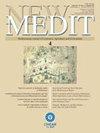Potential socio-economic impact of Xylella fastidiosa in the Near East and North Africa (NENA): risk of introduction and spread, risk perception and socio-economic effects
IF 1.2
4区 经济学
Q3 AGRICULTURAL ECONOMICS & POLICY
引用次数: 5
Abstract
The serious damages of Xylella fastidiosa (Xf) in Euro-Mediterranean countries (Italy, France, Spain) raise concerns for the Near East and North Africa (NENA). Therefore, a study was performed to: a) assess the risk of Xf entry, establishment and spread in target NENA countries (viz. Algeria, Egypt, Jordan, Lebanon, Libya, Morocco, Palestine, Syria, Tunisia); b) analyse risk perception and preparedness level among agri-food chain stakeholders; c) estimate potential socio-economic impacts for olives, grapes and citrus. Pest risk appraisal suggests that Morocco, Lebanon, Palestine and Syria are the most exposed to Xf risk; other target NENA countries, except Algeria, have intermediate risk. Risk perception analysis shows that governance efficacy and practices application can be improved by involving stakeholders and raising their awareness. Socio-economic impact assessment indicates declining yields, production, profitability, export, employment, and increasing import, with the highest impacts relating to olives, then citrus and grapes. The study suggests that the expected socioeconomic impacts are unacceptable and require urgent action against Xf at national and regional levels.近东和北非苛养木杆菌的潜在社会经济影响:传入和传播风险、风险认知和社会经济影响
苛养木杆菌(Xf)在欧洲-地中海国家(意大利、法国、西班牙)的严重危害引起了人们对近东和北非(NENA)的关注。因此,进行了一项研究,以:a)评估Xf在目标NENA国家(即阿尔及利亚、埃及、约旦、黎巴嫩、利比亚、摩洛哥、巴勒斯坦、叙利亚、突尼斯)进入、建立和传播的风险;B)分析农业食品链利益相关者的风险认知和准备水平;C)估计橄榄、葡萄和柑橘的潜在社会经济影响。有害生物风险评估表明,摩洛哥、黎巴嫩、巴勒斯坦和叙利亚是Xf风险最严重的国家;除阿尔及利亚外,其他北非目标国家的风险为中等。风险感知分析表明,通过让利益相关者参与进来并提高他们的意识,可以改善治理效率和实践应用。社会经济影响评估表明,产量、产量、盈利能力、出口、就业下降,进口增加,橄榄受影响最大,其次是柑橘和葡萄。该研究表明,预期的社会经济影响是不可接受的,需要在国家和区域层面采取紧急行动防治Xf。
本文章由计算机程序翻译,如有差异,请以英文原文为准。
求助全文
约1分钟内获得全文
求助全文
来源期刊

New Medit
AGRICULTURE, MULTIDISCIPLINARY-
CiteScore
2.00
自引率
30.00%
发文量
31
审稿时长
>12 weeks
期刊介绍:
New Medit is an applied economics journal, with a multidisciplinary approach, aimed at providing insights into the economic and the social transformations of agro-food sector, rural societies as well as local development and bioeconomy in the Mediterranean Basin.
Manuscripts submitted to NEW MEDIT generally should deal with wide-ranging topics that can be extended to other countries where organisational, production and market conditions and the related development policies may emerge at the corporate or regional level.
 求助内容:
求助内容: 应助结果提醒方式:
应助结果提醒方式:


